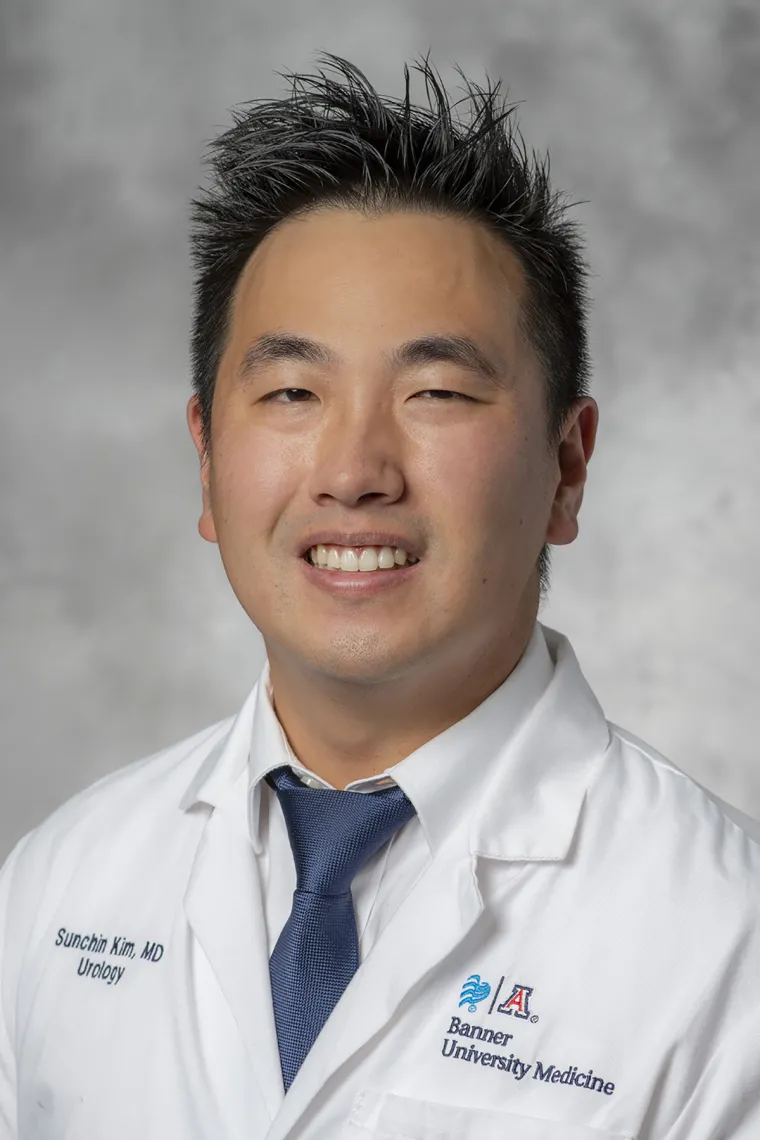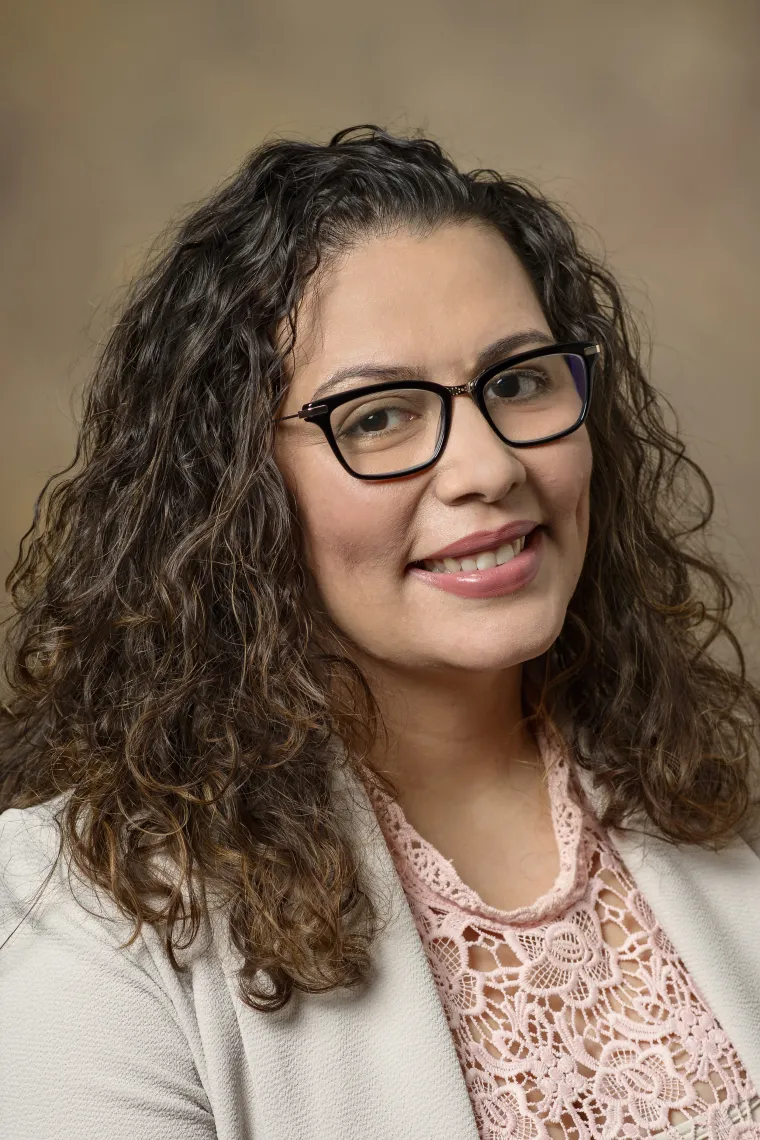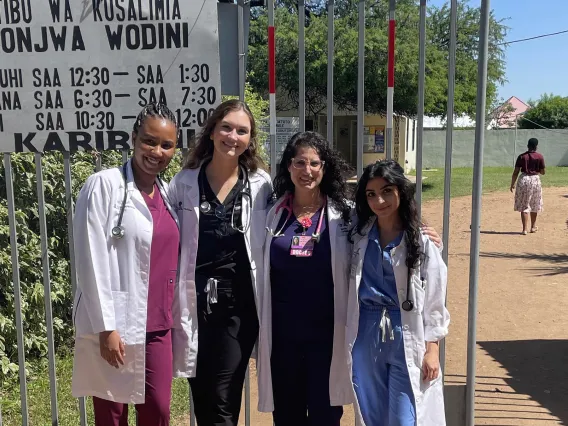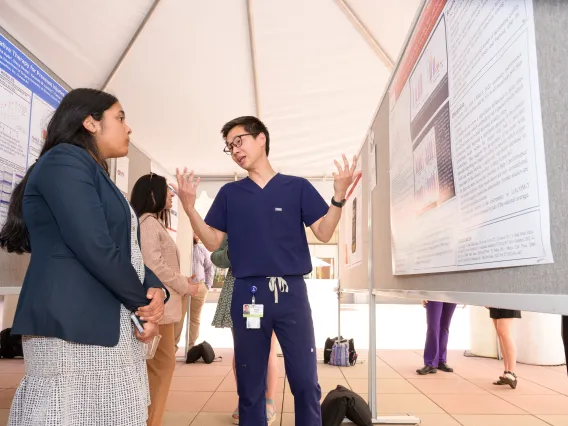Urology
Residency Program
Our program offers exceptional training in both general urology and all major urologic subspecialties, including uro-oncology, endourology and robotics, male reconstructive urology, urogynecology/female pelvic reconstruction, neurourology and urodynamics, and andrology. Our residents benefit from our high surgical volume and the breadth and depth of cases provided from our referral network. Additionally, protected time is built into the schedule for research, academic productivity and manuscript preparation. Residents with work accepted at major national meetings are funded to attend the meeting and present their research.
Our program equips residents with a comprehensive skill set supported by distinguished faculty and state-of-the-art facilities. We remain committed to training the next generation of urologists and to our mission of innovating, cultivating and healing.
About Our Program
Our trainees work closely with our surgeons and colleagues in medical oncology, radiation oncology, pathology, and diagnostic medical imaging to diagnose and treat cancer in a comprehensive and multi-disciplinary approach. Our trainees learn to use fiberoptic and newer digital flexible ureteroscopes for holmuim laster lithotripsy as well as combination pneumatic and ultrasonic ithortripters for larger stones. They learn the most advanced surgical techniques for prostate deobstruction, such as the Holmium Laser Enucleation of the Prostate (HoLEP), and train on all aspects of male reconstruction including placement of artificial urinary sphincters and inflatable penile prosthesis. They will be prepared to treat urethral stricture disease, ureteropelvic junction obstruction, and urethral strictures in addition to post-prostatectomy urinary incontinence and impotence.
Our trainees work closely with our surgeons and colleagues in medical oncology, radiation oncology, pathology, and diagnostic medical imaging to diagnose and treat cancer in a comprehensive and multi-disciplinary approach. Our patients receive personalized care focused on educating the patient and his or her family about cancer and the treatment options available to them. Working with health care providers at the University of Arizona Cancer Center, an NCI-designated comprehensive cancer center, residents and fellows are trained in the most up-to-date conventional, minimally invasive and experimental treatments for urologic cancers. They are among a handful of highly qualified surgeons in Arizona with expertise in robotic surgery as well as traditional complex open surgery.
Trainees interested in working with a pediatric population learn from physicians with many years of experience managing pediatric urology conditions and will compassionately and gently treat children for urologic conditions including undescended testicle, vesicoureteral reflux, varicocele, hypospadias, voiding dysfunction/enuresis, recurrent urinary tract infections and hydronephrosis.
Our team specializes in a wide range of urological disciplines, including:
- Urologic oncology
- Urolithiasis
- Benign prostatic hyperplasia
- Reconstructive urology
- Female urology
- Voiding dysfunction
- Pelvic floor disorders
- Robotic surgery
- Bipolar transurethral resection
- Holmium laser enucleation
- Fusion MRI-targeted biopsy techniques
Trainees will learn to treat patients with advanced procedures such as:
- Nephron-sparing robotic surgery
- Nerve-sparing robotic prostatectomy
- Precision medicine
- Fusion MRI
- High-frequency ultrasound
- Innovative and multidisciplinary approach
Banner University Medical Center – Tucson
1625 N. Campbell Ave., Tucson, AZ 85719
Banner University Medical Center – South
2800 E. Ajo Way, Tucson, AZ 85714
Banner University Medicine – North
3838 N. Campbell Ave., Building 2, Tucson, AZ 85719
Southern Arizona VA Health Care System (SAVAHCS)
3601 S. 6th Ave., Tucson, AZ 85723
Banner Children’s at Desert
1400 S. Dobson Rd., Mesa, AZ 85202
Arizona State Urological Institute
2730 S. Val Vista Dr., Building 13, Ste. 177, Gilbert, AZ 85295
Banner Desert Medical Center
1400 S. Dobson Rd., Mesa, AZ 85202
Banner Desert Surgery Center - Chandler
1125 S. Alma School Rd., Ste. 100, Chandler, AZ 85306
Banner Surgery Center - Estrella
9301 W. Thomas Rd., Phoenix, AZ 85037
International Center for Vasectomy Reversal
850 N. Kolb Rd., Tucson, AZ 85710
Interviews are by invitation only, based on a review of all applications and supporting documents by the faculty. To be considered, submit all required materials through ERAS by the current application deadlines. For details and deadlines, visit the ERAS website.
- ERAS® application
- Three letters of recommendation
- Dean’s letter
- Official transcripts from medical school
- USMLE scores
Our program participates in the SAU Match Process and adheres to SAU guidelines for interviews. Interviews for residency positions will take place on November 12, 2025, and December 10, 2025, in person at our Tucson campus. The interview process includes a dinner with residents the night before, a campus tour, and breakfast and lunch on the interview day.
Training Areas
Not all conditions are rare and complex. In fact, urinary system conditions are some of the most common health problems that people face. Trainees learn to treat patients with general urology conditions including overactive bladders, urinary tract infections and prostatitis. Additionally, they are trained to evaluate the cause of blood in urine (hematuria), screen for PSA elevation, perform vasectomies and treat common issues with blood vessels in the scrotum. At the end of their training, they will be well-versed in state-of-the-art care of their future patients.
Work closely with mentors in medical oncology, radiation oncology, pathology, and diagnostic medical imaging, alongside experts at the University of Arizona Cancer Center — an NCI-designated comprehensive cancer center — trainees will learn to diagnose and treat cancer in a compassionate and multi-disciplinary approach, providing personalized care focused on educating patients and families about cancer and treatment options.
Trainees will learn from urologic surgeons who are experienced in the most up-to-date conventional, minimally invasive and experimental treatments for urologic cancers. They are among a handful of highly qualified surgeons in Arizona with expertise in robotic surgery as well as traditional complex open surgery, offering conventional and experimental therapies and working closely with basic and clinical researchers to offer patients the latest individualized treatments.
Prostate Cancer
Our urologists include some of the only doctors in the state with additional fellowship training in the diagnosis and management of cancer, some of the most experienced robotic surgeons in the state and some of the only urologists in the Southwest comfortable performing salvage prostatectomies. Trainees learn to provide nerve-sparing radical prostatectomy, radiation therapy, cryoablation, androgen-deprivation therapy, and active surveillance with delayed intervention.
Kidney Cancer
Trainees work alongside leaders in the evaluation and treatment of kidney cancer with years of experience and specialized fellowship training, learning to perform the most complex kidney cancer surgeries using robotic, laparoscopic and open approaches in a high-volume kidney cancer referral center. Faculty are active in kidney cancer research, ensuring that trainees receive the latest education in state-of-the-art care. Trainees learn to provide partial nephrectomy, radical nephrectomy, ablation, and active surveillance.
Bladder Cancer
Trainees will learn from urologists with extensive experience in performing the latest and most appropriate bladder cancer surgery for both superficial and invasive bladder cancer. They will learn to provide the latest minimally invasive surgical techniques from a handful of surgeons in Arizona with the expertise in robot-assisted surgery to perform robotic cystectomy in select patients. When reconstruction is required after complete bladder removal, trainees learn to create state-of-the-art, complex orthotopic neobladders to maintain maximum function and body image. Trainees learn to provide chemotherapy, transurethral resection of bladder tumor (TURBT), surgical removal of the bladder (radical cystectomy), and options for the reconstruction of the urinary tract (including ileal conduit, orthotopic neobladder, and continent cutaneous diversion).
Adrenal Cancer & Adrenal Masses
Trainees learn to perform the latest minimally invasive surgical techniques for most adrenal masses, and open surgery for adrenal cancer when necessary. Working alongside endocrinology experts at Banner Health, trainees will be prepared to offer a multi-disciplinary team approach to the care of adrenal disorders. Trainees learn to manage hormone problems caused by benign adrenal tumors using pharmaceutical or surgical options, including adrenalectomy by laparoscopic surgery or traditional open surgery.
Testis Cancer
Trainees will learn about the latest surgical techniques to treat testes tumors from our urologists, who are among a small group in the U.S. experienced in post-chemo retroperitoneal lymph node dissection (RPLND). They will also learn about surgery, radiotherapy, chemotherapy or a combination of these approaches, as well as how to perform radical orchiectomy, RPLND, and surveillance.
Penile Cancer
Trainees learn from urologists with extensive experience treating penile cancer using the latest state-of-the-art care. They will learn to remove cancer, including by performing laser treatment, radiation treatment, circumcision, Mohs microsurgery, liolinguinal lymph node dissection, and chemotherapy.
Trainees will work alongside experts at Banner Health, a major tertiary referral center where the latest technology is available for stone treatment, including fiberoptic and newer digital flexible ureteroscopes for holmium laser lithotripsy as well as combination pneumatic and ultrasonic ithortripters for larger stones. They will learn from surgeons who are experts in ureteroscopy, shockwave lithotripsy, and percutaneous approaches to stone surgery. Trainees will learn all aspects of care, including treatments to aid spontaneous passages of stones, surgical intervention when necessary, and determining the cause of stone disease in each individual patient to develop personalized prevention plans.
Trainees learn from urologists specializing in female pelvic disorders including female urinary incontinence, uterine and vaginal prolapse, and chronic pelvic pain from interstitial cystitis. In partnership with Banner Health, trainees complete their medical education at one of a few centers in the country — and the only hospital in the Southwest — that routinely offer autologous fascia vaginal prolapse repair without use of synthetic mesh. Additionally, our surgeons routinely perform the autologous (non-mesh) sling surgery for stress urinary incontinence. Trainees learn from experts in female pelvic medicine and reconstructive surgery, receiving training on medical and surgical treatments to help stop urine leakage, restore normal anatomy, and relieve pain. Our trainees learn to use the da Vinci robotic surgical system for complex pelvic prolapse surgery, and also learn to provide minimally invasive slings, open surgery or laparoscopic/robotic approaches.
Experts in our department have developed minimally invasive surgical techniques to harvest a patient’s own tissue from the thigh muscles (autologous fascia) and use it to perform repair of vaginal prolapse either through the vagina or robotically through the abdomen to avoid using foreign material such as synthetic mesh. Trainees receive instruction at one of a few centers in the country — and the only hospital in the Southwest — that routinely offers autologous fascia vaginal prolapse repair without use of synthetic mesh. Additionally, our surgeons routinely perform the autologous (non-mesh) sling surgery for stress urinary incontinence. Trainees also learn to employ the latest diagnostic strategies and technology available to accurately diagnose the underlying problem. Treatment options include behavioral modification, medications, physical therapy, and state of the art surgery when necessary. They will learn to perform all diagnostic studies in our clinic, including urodynamics, pelvic floor physical therapy, fluoroscopic urodynamics, retrograde urethrograms and flexible cystoscopy.
Trainees learn the most advanced surgical techniques for prostate deobstruction such as holmium laser enucleation of the prostate (HoLEP). They will work alongside reconstruction specialists to cover all aspects of male reconstruction, including placement of artificial urinary sphincters and inflatable penile prosthesis. They will learn from multiple fellowship-trained urologists seasoned in the management and repair of complex urological pathologies including: urethral stricture disease, ureteropelvic junction obstruction, and urethral strictures in addition to post-prostatectomy urinary incontinence and impotence. When surgery is necessary for urethral stricture disease or for incontinence issues, trainees learn from surgeons who are among the few who can routinely perform these complex reconstructive surgeries.
Trainees learn from physicians with many years of experience managing pediatric urology conditions and will be able to compassionately and gently treat children for urologic conditions, including undescended testicle, vesicoureteral reflux, varicocele, hypospadias, voiding dysfunction/enuresis, recurrent urinary tract infections, and hydronephrosis.
Train alongside fellowship-trained urologic surgeons who specialize in robotic urologic surgery, offering patients cutting-edge, minimally invasive robotic surgical treatments for a variety of urologic diseases.
Initially approved by the FDA in 2000, the da Vinci surgical robotic system has evolved to become an indispensable part of the modern surgical armamentarium. There are several advantages to robotic-assisted surgery. Because of smaller incisions and lack of mechanical retraction during the operation, there is less post-operative pain and faster recuperation. The stereoscopic camera provides 10-fold magnification (improving visualization of key anatomic structures) and depth perception, enabling the surgeon to see deep into the recesses of the abdomen and pelvis — into areas hard to visualize during an open operation.
The instruments also have a greater degree of freedom than a standard laparoscopic instrument and mimic the flexibility of the human hand, thereby facilitating complex suturing and tissue manipulation while shortening overall operative times.
Lastly, the ergonomic posture of the surgeon at the console minimizes chronic injury to the surgeon, increasing productivity and endurance.
Robotic-assisted procedures trainees learn to perform include nerve sparing prostatectomy for prostate cancer, cystectomy with neobladder reconstruction for bladder cancer, partial nephrectomy for renal cancer, pyeloplasty for ureteropelvic junction obstruction of the kidney, ureteral reimplantation for stricture disease, and sacrocolpopexy for vaginal prolapse.
Robotic Surgery: Educational Videos
Watch members of our team perform the types of surgeries our trainees will learn how to do, guided by experts from the University of Arizona College of Medicine – Tucson Department of Urology and our clinical partners at Banner Health.
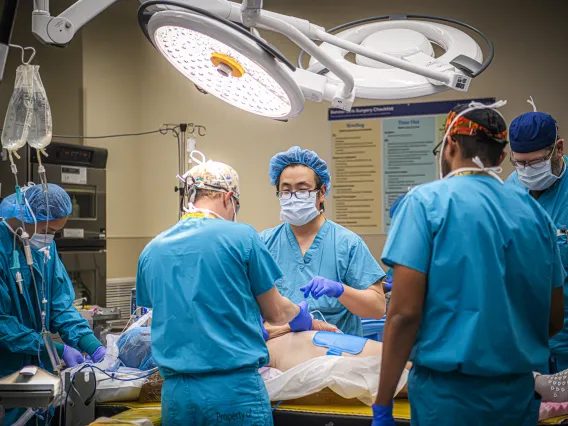
Meet our current residents and see where our alumni ended up after completing their training here.

Learn more about the residency and fellowship programs at the College of Medicine – Tucson.
Training in Tucson



